Both This Year's Broadway Musicals Featuring Cinderella Were Flops!
Two new Broadway musicals featured Cinderella as a leading lady this year, and neither of them lasted for even four months on the Great White Way. The first was Bad Cinderella, adapted from Andrew Lloyd Webber's short-lived Cinderella musical on the West End. The other was the Britney Spears jukebox musical, Once Upon a One More Time, which sounded like a bad idea from its inception. Both shows suffered from poor ticket sales, backstage drama, and criticism over the long-running trend of modernizing old fairy tales. Yet, the problem is not with the character of Cinderella herself, who has been a long-standing icon of fortune, romance, and glamour, but rather with the media's obsession of correcting popular stories to fit a standardized feminist narrative. After all, the most famous Cinderella musical, Rodgers and Hammerstein's Cinderella, has enjoyed great success for many decades with numerous adaptations and revivals, one of which is allegedly still on the way.
On the other hand, Once Upon a One More Time was a true dumpster fire that incorporated everything that Bad Cinderella pretended to be. Featuring Betty Friedan as the "Original Fairy Godmother" or "OFG" for short, the show panders hard to modern feminists by showing public domain versions of famous Disney Princesses who choose to reject their stories that were written by bad men and tell their own tales. The notion of fairy tale characters rejecting their narrator because they don't like the story he's telling hearkens back to Stephen Sondheim's Into the Woods. Yet, that show saw more success thanks to its original score. Once Upon a One More Time shoehorns in the early 2000s pop tunes of Britney Spears in a feeble attempt to appeal to its audience's nostalgia despite the fact that these songs have very little to do with the story. The show presents Cinderella as an actress who is forced to perform the same story over and over again every time a little girl reads it. In a tired old cliché, Prince Charming turns out to be a jerk who isn't worth her time, forcing her to rewrite her own story to find a happy ending. The problem is that the fairy tale already had one, so the show doesn't make a whole lot of sense. The narrative of taking back your own story makes more sense in a show like Six because Henry VIII was already known throughout history to be horrible toward women and wasn't written that way to fill a checkbox, which accounts for why that show was so much more successful.
"Cinderella" is a story that will be told and retold until the end of time. It is a hopeful and empowering tale of finding light in a dark situation. However, the sales of this year's two Broadway shows that attempt to rewrite her story prove that it was never in need of fixing. In the case of Bad Cinderella, it was more of a marketing issue, while the problem with Once Upon a One More Time rests within the show itself. Meanwhile, the Rodgers and Hammerstein version, which, in my opinion, is the best adaptation there is, continues to celebrate endless success with an upcoming Jennifer Lopez series, a reprise of Brandy and Paolo Montalban's roles from their made-for-TV adaptation of the show, and many popular performances at schools and community theaters. This long-lasting success proves that the fairy tale was already perfect the way it was and never needed a feminist update. If Bad Cinderella hadn't been promoted as the "bad" one, perhaps it could have prompted a resurgence of love for the original story. The failure of both of 2023's "Cinderella" adaptations is something Disney can learn from for their upcoming "Snow White" movie, which many people are already boycotting due to the anticipated changes to the point that a more accurate adaptation is being made just to compete with it.
The recent Broadway adaptations of Cinderella have shed light on the challenges of modernizing beloved fairy tales. While both Bad Cinderella and Once Upon a One More Time faced difficulties, they showcased different issues. Bad Cinderella suffered from misleading marketing, potentially obscuring the genuine themes of the original story that could have resonated with audiences. In contrast, Once Upon a One More Time struggled with a narrative that felt disconnected from the core essence of Cinderella's timeless tale, attempting to incorporate Britney Spears' songs without a strong tie to the storyline. The enduring success of Rodgers and Hammerstein's Cinderella serves as a testament to the timeless appeal of the classic narrative, demonstrating that attempts to force a feminist update may not always be necessary or well-received. The failures of these adaptations offer insight for future reimaginings of classic tales, urging a careful balance between relevance and authenticity. These lessons could be crucial for Disney's upcoming Snow White amidst concerns about potential deviations from the original story. Ultimately, the struggles of these Broadway adaptations underscore the enduring charm and relevance of Cinderella's timeless tale, while also emphasizing the importance of staying true to the essence of beloved classics when considering modern interpretations.














Comments